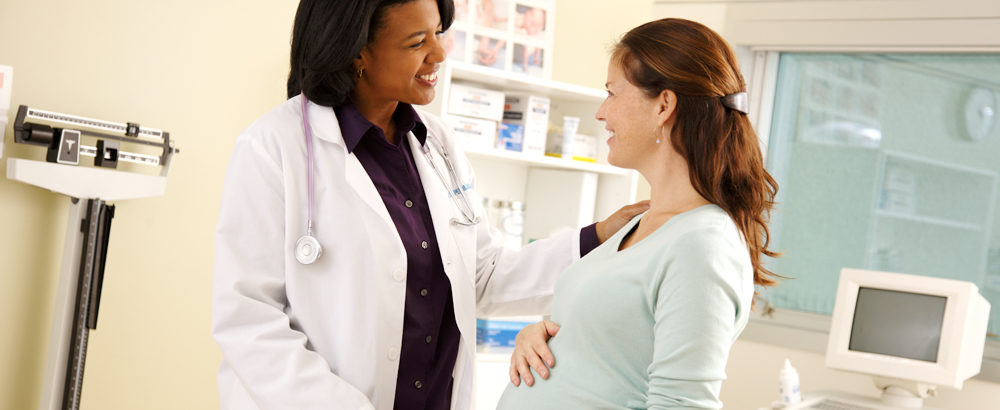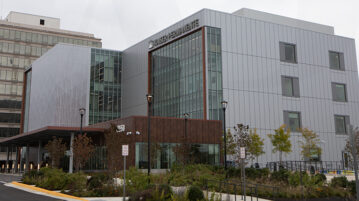By Pim Suwannarat, MD
Prenatal genetic testing isn’t for everyone; it’s a very personal choice. Before you embark on this path, it’s a good idea for you and your partner (along with your health care provider or a genetic counselor) to discuss the pros and cons of screenings and diagnostic tests and how you would use the results.
Some expectant parents find testing valuable in helping them prepare for their baby’s birth and first few months. For instance, if it turns out that your baby is at high risk for Down syndrome, you can have more detailed ultrasounds, as there is a higher risk for heart defects. Your baby can also undergo more extensive evaluations after birth to make sure all complications are identified and addressed as early as possible. And the earlier you start testing, the better; each test’s results can take one to two weeks to come back, and some interventions and further tests are best done early in a pregnancy.
What Testing Can Uncover
As you consider undergoing genetic testing, it’s important to know what can and can’t be screened for. Autosomal recessive disorders (conditions that only appear in children who receive a copy of a disease-causing genetic change in the same gene from both parents) that can come up in testing include:
- Cystic fibrosis (affects the lungs, pancreas, and other organs)
- Sickle cell disease (blood disorder)
- Tay-Sachs disease (causes progressive degeneration of central nervous system)
- Thalassemia (blood disorder)
Testing can also tell you if your baby will have an open neural tube defect, or a brain or spinal cord birth defect, such as spina bifida. Testing can also screen for and diagnose certain chromosome disorders, such as Down syndrome and Trisomy 18.
Screening vs. Diagnostic Genetic Testing
Prenatal genetic testing comes in two types of tests: screening and diagnostic. Screening tests, performed on one or both parents, can tell you how likely it is that your baby could be born with one of these autosomal recessive disorders. Male partners are only tested if a screening indicates that the mother could be a carrier. Depending on the disorders of concern, women (and their partners, if need be) can be screened before and several times throughout a pregnancy to best predict the likelihood of a baby being born with a genetic disorder.
Women often undergo carrier screening via blood test or cheek swab either before getting pregnant or during the first trimester. This is usually screening for carrier status for autosomal recessive disorders. You will often have the option of screening for chromosome disorders during the first trimester via fetal ultrasound and a blood test, usually when you are between 11 and 13 weeks pregnant.
During the second trimester, at around 18 to 20 weeks, women typically undergo another ultrasound scan to check for major physical defects. Regardless of whether you undergo any of the earlier screening options, this ultrasound is recommended. All of these tests will help determine the risk for certain genetic birth defects and disorders.
If you prefer not to opt for the first trimester screening or your provider counsels you against it due to certain risk factors, you can choose a prenatal cell-free DNA screening for your first- and second-trimester screenings. This involves a blood test (taken from the mother) that looks at fetal DNA in the mother’s blood and chromosome imbalances in the fetus itself. This kind of screening can be done from 10 weeks on.
Based on the results of whichever screening test(s) you choose, a risk number is assigned to each possible disorder, which helps determine whether diagnostic tests should be run. If you and your partner are both carriers for a particular gene for a disorder, there is a 25 percent chance that your child will be born with that condition.
Diagnostic tests, such as chorionic villus sampling and amniocentesis, are done on cells from the fetus or placenta, and can determine if your baby actually has a disorder that may have been indicated in a screening test. These are most often given if a screening test indicates the fetus is at risk for a disorder, though any woman can request them.
Chorionic villus sampling is performed during the first trimester to determine whether the fetus has 46 chromosomes, the normal number. This test will determine if your child will have certain birth defects or other genetic conditions. Amniocentesis is most often performed between weeks 15 and 20 of pregnancy, though there are some cases when it’s done earlier or later. Amniocentesis can also determine whether the fetus has 46 chromosomes, the normal number. Both tests can also determine if the fetus is affected with an autosomal recessive disorder for which both parents are carriers. Amniocentesis can also detect open neural tube defects, such as spina bifida.
Both of these diagnostic tests are invasive outpatient procedures and carry a small risk for miscarriage (less than one in 900 for both procedures). Your doctor can provide more details should these be something you choose to pursue.
Who Should Be Tested
While screening is optional, you may want to seriously consider it if you are a member of certain racial/ethnic groups that are genetically at higher risk for certain disorders:
- Those of European Caucasian descent (cystic fibrosis)\
- Those of Ashkenazi Jewish descent (cystic fibrosis and Tay-Sachs)
- African-Americans (sickle cell disease and thalassemia)
- Those of Mediterranean descent (sickle cell disease and thalassemia)
- Those of Southeast Asian descent (thalassemia)
- French Canadians (cystic fibrosis and Tay-Sachs)
- Women of advanced maternal age (Down syndrome)
The Role of a Genetic Counselor
If tests indicate that your baby is at high risk for or has a condition or birth defect, you will likely be referred to a genetic counselor, who can help you and your partner make decisions about a pregnancy. The counselor will explain what the results mean, what each disorder is, and what to expect if your baby has a particular condition. Genetic counselors can also help you make decisions about when additional testing will be done (during or after the pregnancy). If testing indicates a problem, the genetic counselor can become an important part of your pregnancy team.
While genetic disorders and birth defects aren’t typical, they do happen. By getting screened early, you can better prepare, and in some cases, even help your baby have a healthier future.
Want more information? Visit MAPMG’s Staying Healthy pages to learn more about prenatal diagnostic tests.




